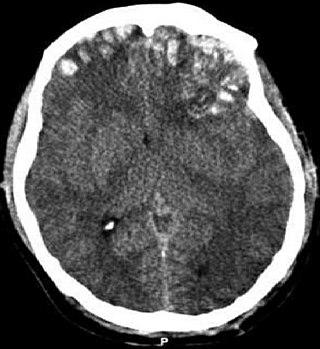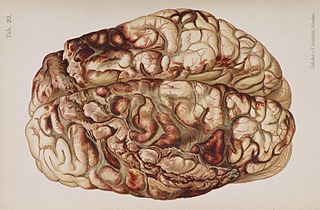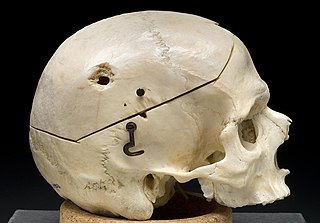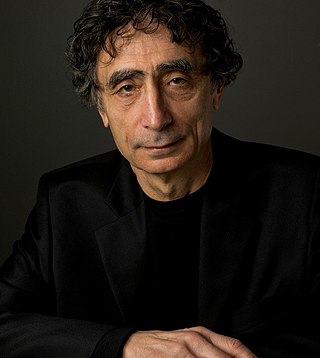
Neurosurgery or neurological surgery, known in common parlance as brain surgery, is the medical specialty concerned with the surgical treatment of disorders which affect any portion of the nervous system including the brain, spinal cord and peripheral nervous system.

A head injury is any injury that results in trauma to the skull or brain. The terms traumatic brain injury and head injury are often used interchangeably in the medical literature. Because head injuries cover such a broad scope of injuries, there are many causes—including accidents, falls, physical assault, or traffic accidents—that can cause head injuries.
Psychological trauma is an emotional response caused by severe distressing events that are outside the normal range of human experiences. It must be understood by the affected person as directly threatening the affected person or their loved ones with death, severe bodily injury, or sexual violence; indirect exposure, such as from watching television news, may be extremely distressing and can produce an involuntary and possibly overwhelming physiological stress response, but does not produce trauma per se. Examples include violence, rape, or a terrorist attack.

A traumatic brain injury (TBI), also known as an intracranial injury, is an injury to the brain caused by an external force. TBI can be classified based on severity ranging from mild traumatic brain injury (mTBI/concussion) to severe traumatic brain injury. TBI can also be characterized based on mechanism or other features. Head injury is a broader category that may involve damage to other structures such as the scalp and skull. TBI can result in physical, cognitive, social, emotional and behavioral symptoms, and outcomes can range from complete recovery to permanent disability or death.

A penetrating head injury, or open head injury, is a head injury in which the dura mater, the outer layer of the meninges, is breached. Penetrating injury can be caused by high-velocity projectiles or objects of lower velocity such as knives, or bone fragments from a skull fracture that are driven into the brain. Head injuries caused by penetrating trauma are serious medical emergencies and may cause permanent disability or death.
An induced coma – also known as a medically induced coma (MIC), barbiturate-induced coma, or drug-induced coma – is a temporary coma brought on by a controlled dose of an anesthetic drug, often a barbiturate such as pentobarbital or thiopental. Other intravenous anesthetic drugs such as midazolam or propofol may be used.

Yvon of the Yukon is a Canadian animated television series produced by Studio B Productions and Corus Entertainment in association with Alliance Atlantis Communications for seasons 1-2. It was produced with the participation of the Canadian Television Fund and the Canadian Film or Video Production Tax Credit with the assistance of British Columbia Film and the Film Incentive BC grant from the province of British Columbia. Based in the fictional Canadian town of Upyermukluk, the show premiered on YTV during Fall 2000, and aired with the final episode on 24 January 2004.

Sunnybrook Health Sciences Centre (SHSC), commonly known as Sunnybrook Hospital or simply Sunnybrook, is an academic health science centre located in Toronto, Ontario, Canada. It is the largest trauma centre in Canada and the only accredited Level 1 trauma centre outside of the US. Sunnybrook is a teaching hospital fully affiliated with the University of Toronto. The hospital is home to Canada's largest veterans centre, in the Kilgour Wing and the George Hees, which cares for World War II and Korean War veterans.

Blunt trauma, also known as blunt force trauma or non-penetrating trauma, describes a physical trauma due to a forceful impact without penetration of the body's surface. Blunt trauma stands in contrast with penetrating trauma, which occurs when an object pierces the skin, enters body tissue, and creates an open wound. Blunt trauma occurs due to direct physical trauma or impactful force to a body part. Such incidents often occur with road traffic collisions, assaults, sports-related injuries, and are notably common among the elderly who experience falls.
Jerry Gordon Sturm was an American professional gridiron football player. He played college football at the University of Illinois at Urbana–Champaign. He played professionally in Canadian Football League (CFL) for the Saskatchewan Roughriders (1958), and Calgary Stampeders (1959–1960), the American Football League (AFL) for the Denver Broncos (1961–1966), and in the National Football League (NFL) for the New Orleans Saints (1967–1970), Houston Oilers (1971), and Philadelphia Eagles (1972). He was an American Football League All-Star in 1964 and 1966.

Chronic traumatic encephalopathy (CTE) is a neurodegenerative disease linked to repeated trauma to the head. The encephalopathy symptoms can include behavioral problems, mood problems, and problems with thinking. The disease often gets worse over time and can result in dementia.

A gunshot wound (GSW) is a penetrating injury caused by a projectile from a gun. Damages may include bleeding, bone fractures, organ damage, wound infection, loss of the ability to move part of the body, and in severe cases, death. Damage depends on the part of the body hit, the path the bullet follows through the body, and the type and speed of the bullet. Long-term complications can include bowel obstruction, failure to thrive, neurogenic bladder and paralysis, recurrent cardiorespiratory distress and pneumothorax, hypoxic brain injury leading to early dementia, amputations, chronic pain and pain with light touch (hyperalgesia), deep venous thrombosis with pulmonary embolus, limb swelling and debility, and lead poisoning.
Timothy Houlihan is a former Australian rules footballer who played for the West Coast Eagles in the Australian Football League (AFL), and also for East Fremantle in the West Australian Football League (WAFL) and South Adelaide in the South Australian National Football League (SANFL).
Post-traumatic amnesia (PTA) is a state of confusion that occurs immediately following a traumatic brain injury (TBI) in which the injured person is disoriented and unable to remember events that occur after the injury. The person may be unable to state their name, where they are, and what time it is. When continuous memory returns, PTA is considered to have resolved. While PTA lasts, new events cannot be stored in the memory. About a third of patients with mild head injury are reported to have "islands of memory", in which the patient can recall only some events. During PTA, the patient's consciousness is "clouded". Because PTA involves confusion in addition to the memory loss typical of amnesia, the term "post-traumatic confusional state" has been proposed as an alternative.

Gabor Maté is a Canadian physician. He has a background in family practice and a special interest in childhood development, trauma and potential lifelong impacts on physical and mental health including autoimmune disease, cancer, attention deficit hyperactivity disorder (ADHD), addictions and a wide range of other conditions.
Amnesia is a deficit in memory caused by brain damage or brain diseases, but it can also be temporarily caused by the use of various sedative and hypnotic drugs. The memory can be either wholly or partially lost due to the extent of damage that is caused.
Steven R. Flanagan is a nationally renowned expert in the field of traumatic brain injury (TBI) and is professor and chairman of the Department of Rehabilitation Medicine at the New York University School of Medicine, and the medical director of the Rusk Institute of Rehabilitation Medicine at the NYU Langone Medical Center.

Earl Forrest Rose was an American forensic pathologist, professor of medicine, and lecturer of law. Rose was the medical examiner for Dallas County, Texas, at the time of the assassination of United States President John F. Kennedy and he performed autopsies on J. D. Tippit, Lee Harvey Oswald, and Jack Ruby. After being shoved by Kennedy's aides, he stepped aside and allowed Kennedy's body to be removed from Parkland Memorial Hospital without performing an autopsy.
Frederick Robert "Ted" Carrick is a senior research fellow at the Bedfordshire Centre for Mental Health Research in association with the University of Cambridge, Cambridge, UK. Carrick is the founder of Carrick Institute for Graduate Studies in Cape Canaveral, Florida.
Doug MacIver was a former professional Canadian football player and successful car dealer, known for his tenacity on the football field and innovative spirit in the showroom.










